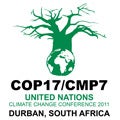 One of those small but important agreements that would mean that Durban had moved the ball forward in the search of an international, comprehensive approach to climate change is a forum to discuss trade issues.
One of those small but important agreements that would mean that Durban had moved the ball forward in the search of an international, comprehensive approach to climate change is a forum to discuss trade issues.
As countries seek lower emissions development, and plan out pathways to greener growth, they are considering introducing different forms of “green subsidies”, border tax arrangements, embedded carbon footprint standards which many in the developing world feel will be exclusionary.
A new generation of new tariff and non-tariff barriers is feared.
This is complicated by the question of where to resolve this - in the WTO or the UNFCCC. So, in order to move forward, start looking at the issues in a practical way, learn lessons from different approaches: the idea of a forum.
The success of such a forum could be an important input to the growing body of work around how to make greener growth for all, or as Ban Ki Moon said today at a meeting of heads of UN agencies and minister of environment, “sustainable green growth.”
We are keeping up the pressure for inclusion of language that would allow a work program on agriculture to start up. While some delegations object to agriculture’s inclusion for fear it dilutes the agenda, others fear the carbon content of agri-products and green standards, on top of existing phyto-sanitary standards and other aspects of agriculture trade.
While today only 15% of the global food supply is subject to international trade, that is expected to double as the world population rises from 7 to 9 billion.
Follow Rachel Kyte's tweets (@RKyte365) at her liveblog from the COP17 conference in Durban


Join the Conversation